Headaches are an almost universal experience, affecting approximately 96% of people globally at some point in their lives. Migraines, with a lifetime prevalence of 12.9% to 15.2%, consistently rank among the top three leading causes of disability for both men and women.
Olfactory Function Loss in GW Veterans Linked to Cognitive Deficits
A disorder related to military service in the 1991 Gulf War (GW), Gulf War illness (GWI)/Chronic Multisymptom Illness (CMI), includes symptoms such as fatigue, pain and cognitive dysfunction.
Smaller Brainstem Volumes Found in Gulf War, Iraq/Afghanistan Veterans
Gulf War and Iraq/Afghanistan veterans have significantly smaller brainstem volumes compared to healthy civilians, and damage to the brainstem structure of these veterans could potentially lead to sleep disturbances and chronic pain, according to a recent study.
Herpes Zoster Infection Doesn’t Increase Parkinson’s Risk
Some researchers have postulated for years that systemic infections are associated with development of Parkinson’s disease (PD). Recent studies on the relationship between herpes zoster (HZ) and PD have been conflicting, however.
Smaller Brainstem Volumes Found in Gulf War, Iraq/Afghanistan Veterans
Gulf War and Iraq/Afghanistan veterans have significantly smaller brainstem volumes compared to healthy civilians, and damage to the brainstem structure of these veterans could potentially lead to sleep disturbances and chronic pain, according to a recent study.
Gut Microbiome May Hold Potential Early Biomarkers for Parkinson’s Disease
Parkinson’s disease (PD) is a complex neurodegenerative disorder that affects approximately 1% of the population age 65 and older and an estimated 110, 000 U.S. veterans.
Review Looks at Higher Alzheimer’s Rates Among Blacks in U.S.
Why do Black/African-American (AA) individuals have a higher risk of Alzheimer’s disease (AD) than white non-Hispanic persons of European ancestry (EUR)?
More Flexible Lookback Periods for Dementia Also Useful
Alzheimer’s disease and related dementias (ADRD) often are identified using a list of claims codes and a fixed lookback period of three years of data.
Monogalactosyl Diglyceride Levels Rise With Alzheimer’s Progression
While many clinical studies have reported brain lipidomic abnormalities in Alzheimer’s disease (AD) that affect glycerophospholipids, sphingolipids and fatty acids, no consensus exists about those abnormalities and whether they relate to disease progression.
Prazosin Reduces Frequency, Impact of Mild Traumatic Brain Injury Headaches
The blood pressure medication prazosin might dramatically reduce the occurrence of headaches following mild traumatic brain injury (mTBI), according to a new study by researchers at VA Puget Sound Health Care System in Seattle.
Unexpected Brain Connectivity Changes Found in Fighter Pilots
A new international study is raising concerns about neurologic effects on U.S. airborne warfighters and Space Force guardians alike.
Cognitive Impairment Can Affect Parkinson’s Gait Rehab
What is the effect of baseline cognition on gait outcomes after a treadmill training program for Parkinson’s disease (PD) patients?
Sequential Electrical Stimulation Device Relieves Pain in Veterans Study
Despite changes in physical training routines and equipment designed to reduce musculoskeletal injuries in servicemembers and veterans, veterans experience back and joint pain at a higher rate than their contemporaries who have never served.
VHA Data: Migraine Is a Commonly Treated Condition Among Veterans
Migraine is a commonly treated condition at the Veteran’s Health Administration (VHA), with more than half-million veterans being diagnosed during a 12-year study period, according to a recent study.
New VA Therapy Reduces Pain, Disability, PTSD Symptoms Following TBI
Military servicemembers and veterans are at high risk for head injury compared with civilians. More than 369,000 U.S. veterans have at least one mild traumatic brain injury, and many report the onset or worsening of headache within three months of their injury.
Pain Associated With Gray-Matter Volume Differences in Gulf War Veterans
Gulf War veterans with chronic pain display changes in the volume of key areas of the brain, a finding that could explain why these veterans experience prolonged pain, according to a new study.
Chronic Traumatic Encephalopathy Is Uncommon in Brains of Military Personnel
Military personnel exposed to attacks with high explosives frequently experience neuropsychiatric symptoms, including cognitive dysfunction, behavioral changes, mood disturbances and suicidality.
Military/VA Search for New, Nonopioid Methods to Combat Chronic Pain
The last decade has seen health systems the world over shift away from using opioids for pain management. First there was the too-slow understanding that opioids are addictive and were being massively over-prescribed.
Niacin Supplements Appear to Help PD Motor Function
Can niacin supplementation improve motor symptoms in Parkinson’s disease patients?
Altered Cholinergic Innervation in New Parkinson’s Patients
While evidence is strong that altered cholinergic innervation plays a key role in cognitive impairment in Parkinson’s disease (PD), at least in advanced stages, less is known about the relationship between cognitive impairment and cholinergic innervation early in the disease.
Adverse Events Predict Cognitive Decline After Brain Stimulation
In a small subset of Parkinson’s disease patients, deep brain stimulation is linked to statistically and clinically significant cognitive declines.
Dry Eye Worse in Veterans With GWI
Veterans with Gulf War illness (GWI) have more severe dry eye (DE) symptoms, including neuropathic eye pain questionnaire scores, when compared to those who served during the Gulf War but did not meet criteria for GWI.
Predicting MS Development After Optic Neuritis in Military
A new military study looked at how accurately a type of eye inflammation predicts later multiple sclerosis development.
TAPS Can Be the Start of Something Good for Veterans with Essential Tremor
Veterans are used to the sound of Taps marking an end. For a growing number, TAPS may indicate the beginning of a road to recovery of independence.
Seizures Appear to Signal Worse Cognition in TBI Patients
For hospitalized patients with moderate to severe traumatic brain injuries, more than half have seizures and abnormal periodic or rhythmic patterns observed on continuous electroencephalography monitoring (cEEG).
Battlefield Blast Exposure Linked to Mental Health Effects
Chronic mental health symptoms including post-traumatic stress, depression and neurobehavioral issues increase proportionately with blast exposure severity, according to a new study.
More Epilepsy Counseling, Education Needed at VA
While care of epilepsy patients tends to be high quality at the VHA, not enough emphasis is placed on education and counseling, according to a new study.
Navy Study Suggests Post COVID-19 Symptoms Can Affect Military Readiness
At 0.2% percent, the military’s current COVID-19 mortality rate is far lower than that of the general American public, which is just under 2%. But often those who contract and survive COVID-19 have to live with its long-term effects, regardless of the severity of their acute illness.
Veterans’ Diseases Presumed to Be Linked to Agent Orange Exposure
VA has recognized certain cancers and other health problems as presumptive diseases associated with exposure to Agent Orange or other herbicides during military service. Veterans and their survivors may be eligible for benefits for these diseases.
Global Warming Might Exacerbate Disease Burden of Multiple Sclerosis
While the global effects of climate change are much discussed, research now is evaluating the much more specific consequences of temperature fluctuations, including detrimental outcomes for multiple sclerosis patients.



